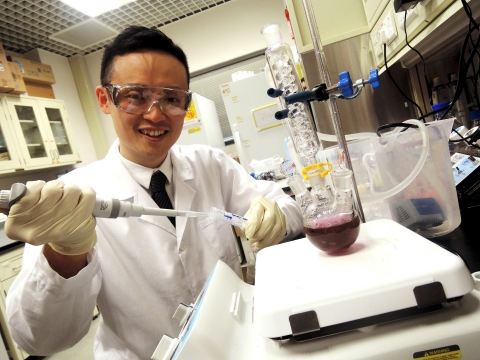Prof. Jonathan Choi Chung-hang from the Department of Electronic Engineering (Biomedical Engineering) received a Croucher Innovation Award 2016 in the amount of HK$ 5 million. He is the first recipient from CUHK since the inauguration of this award by the Croucher Foundation in 2012. The award was presented to him by Prof. Rosie Young, GBS JP, at the presentation ceremony held on 13 April. Guiding the Delivery of Nanoparticles by Elucidating ‘Bio-Nano’ Interactions Bionanotechnology is now under active development. For instance, biomolecules such as lipids and proteins may be combined with therapeutic entities (e.g., small molecules, antisense oligonucleotides) to form therapeutic nanoparticles (typically 1-100 nm in size), which exhibit immense potential in treating diseases. For nanoparticles to exert their therapeutic effect, precise delivery is imperative. Yet, strategies for delivering therapeutic nanoparticles to specific body locations except for the liver and spleen remain scarce, partially due to the lack of knowledge in in vivo pharmacological fate (e.g., distribution, cellular uptake, intracellular trafficking). Professor Choi specializes in the interactions of nanoparticles with the body across the length scales of organ, tissue, cell, and organelle. His mechanistic research will inform useful ‘design rules’ for building more potent therapeutic nanoparticles. He previously reported novel ‘bio-nano’ interactions between nanoparticles and the kidney, demonstrating that intravenously injected nanoparticles of around 75 nm in diameter can accumulate inside the kidney mesangium and enter mesangial cells at the highest amounts when compared to nanoparticles of other sizes (Choi CHJ et al., PNAS, 2011). These data will aid the development of new delivery strategies to the kidney. With this award, he hopes to design nanoparticles for detecting kidney diseases in vivo. Many kidney diseases have no symptom or sign. Kidney failure impairs the normal function of the other organs of the body. It may progress to end-stage kidney failure, which is fatal if not supported with dialysis treatment or kidney transplant. According to the Hospital Authority, currently there are more than 7,000 patients with end-stage kidney failure in Hong Kong – this is 90% higher than 10 years ago. Chronic kidney failure cannot be cured, and the treatment processes usually bring tremendous psychological and financial burdens to the patients. Professor Choi hopes the new delivery strategies can help patients to get treatment earlier and relieve their suffering. Professor Choi remarked, ‘It is my deepest honor to be bestowed with this prestigious award where past awardees hailed from all branches of engineering, medicine, and science. I wish to share this award with my PhD students and postdoctoral fellows. As a young investigator, I am indebted to my senior colleagues in the Faculty of Engineering at CUHK for their mentorship. The Croucher Innovation Award will empower me to forge research collaborations in biomedical engineering with colleagues from the Faculties of Medicine and Science.’ Professor Choi added, ‘I hope to inspire more young and talented Hong Kong students to pursue a career in science and engineering.’ Biomedical engineering (BME) is slowly gaining traction in Hong Kong. Its research projects often require the participation of not only chemists or materials scientists to engineer novel biomaterials but also life scientists and physicians to understand their biological behavior. Given the ageing population in Hong Kong, Professor Choi expects that the general public will gradually cherish the importance of BME, as BME students are uniquely poised to deliver innovative healthcare solutions (e.g., drugs and medical devices) and assist physicians in better managing patients. He urged BME students to keep an open mind on collaborative opportunities with researchers from other fields. ‘When the right moment of inspiration comes, they will be able to connect the dots between different disciplines,’ he added. Biography of Prof. Jonathan Choi In 2013, Professor Choi joined CUHK as an assistant professor in the Department of Electronic Engineering. As a core member of the Biomedical Engineering Programme, his research interests lie in drug delivery, ’bio-nano’ interactions, bionanomaterials, and biological imaging. Born and raised in Hong Kong, Professor Choi completed his secondary school studies at Wah Yan College Hong Kong, scoring 10 distinctions in the HKCEE in 2000. He later moved to the U.S. and obtained his B.S. and M.S. degrees in chemical engineering from Stanford University in 2005 and 2006, respectively. In 2011, he received his Ph.D. degree in chemical engineering from the California Institute of Technology. For his dissertation, he established important design rules for delivering nanoparticles to the tumor and kidney mesangium in vivo. From 2011 to 2013, he worked as a Croucher postdoctoral fellow at Northwestern University, where he studied how bionanomaterials enter and subsequently traffic inside the cell. The Croucher Innovation Award The Croucher Innovation Awards aim to identify a small number of exceptionally talented scientists from all countries working at an internationally competitive level and to offer substantial support to these ‘rising stars’ at a formative stage in their careers. This scheme is designed to enable recipients to pursue their own scientific, intellectual and professional inclinations, to advance their expertise, to engage in bold new work, and to contribute to the development of education and research in Hong Kong. |
|


